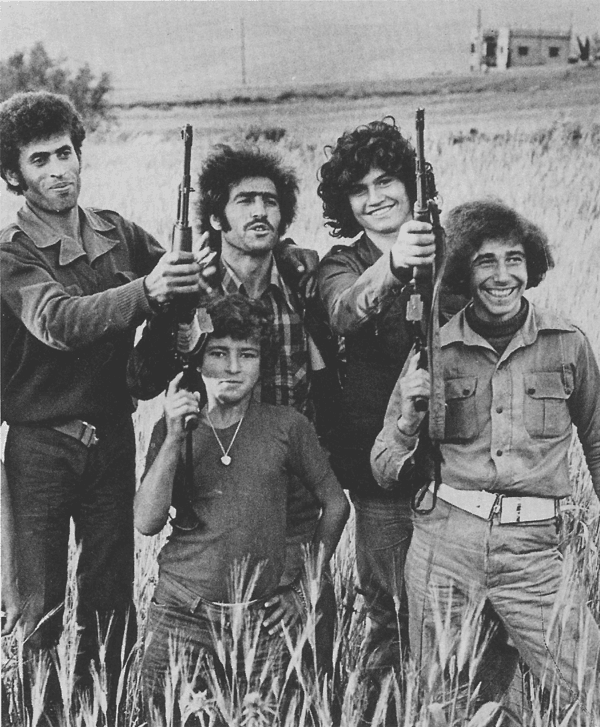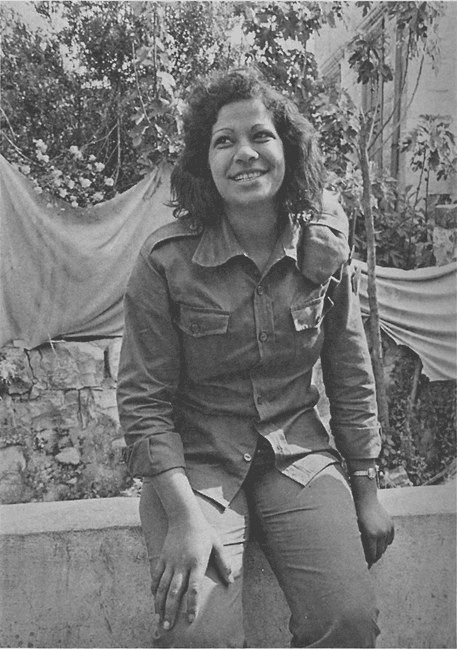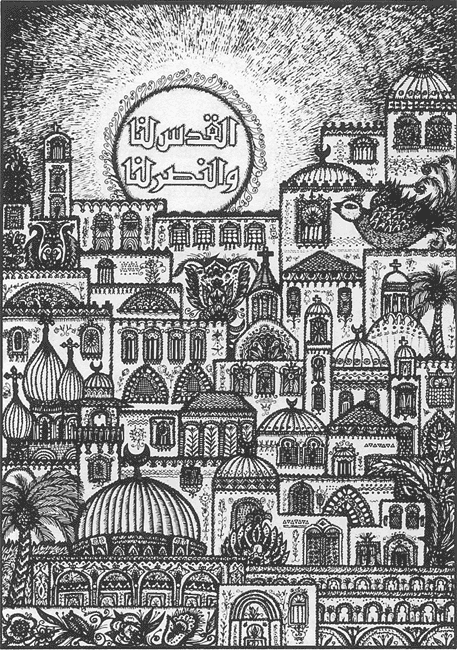Our Roots Are Still Alive - Postscript
Previous: Conclusion
Table of Contents
Next: Recommended Reading
New Jersey Solidarity-Activists for the Liberation of Palestine Main Site
Postscript: "We Shall Never Forget Palestine"
In May 1977, one of the authors traveled with a small group of Americans to Lebanon and the occupied territories. One purpose of the trip was to see the effect of the Lebanese civil war on the strength and morale of the Palestinian people. As the following excerpts from her journal indicate, the Palestinians emerged from the fighting more determined than ever to create a democratic secular state in their homeland.
Damour, Lebanon
A tattered banner hangs over the main street of Damour, the temporary home of eighteen thousand refugees from Tal al Zaatar. It reads: "Karameh taught us courage." To the survivors of Tal al Zaatar, the meaning is clear-the defense of their camp was, like the battle of Karameh in 1968, a turning point, an event that strengthened and deepened the roots of the Palestinian revolution. Such an understanding helps people face their bitter memories and their personal losses.
Most people in Damour lost more than one family member at Tal al Zaatar. Zeinah Qassem, for example, lost her father and two brothers. She is seventeen years old and fought at Tal al Zaatar in the bloody battles on the outskirts of the camp. On the last day, she escaped into the mountains, living for six days without food or water before she reached Damour. Her eyes flashing, Zeinah explains the lesson of Tal al Zaatar: "The enemy won't destroy the people. We will never forget Palestine! The revolution did not begin in Tal al Zaatar to end in Tal al Zaatar."
Zeinah today is chief of military training in Damour for the Ashbals, children between the ages of seven and fourteen. She is typical of the teenagers who have shouldered many responsibilities in Damour -since many of the older men died in the massacre on the last day. Zeinah belongs to a generation of Palestinians that has emerged from the harsh fighting in Lebanon determined to build a peaceful future in Palestine for its children.
We hesitate at first to probe the grim memories of the siege and massacre of Tal al Zaatar. But people dispel our awkwardness quickly, telling us affectionately of the special heroisms or sufferings of their friends. At a party, Zeinah disappears to return with a special food from Zaatar-a dip of oil and thyme. Tal al Zaatar means "hill of thyme." Ahmed, a slender twelve-year-old boy with large brown eyes, who was born in Tal al Zaatar, spends an hour drawing an exact picture of the camp in my notebook. He exclaims, "Next to Palestine, I love Tal al Zaatar!" In these small ways, people continue to affirm that they have not forgotten their homes. For these children and thousands of other Palestinians, Tal al Zaatar has become not a painful memory, but a symbol of revolution.
Southern Lebanon
According to the Palestinian fighters, Israel's involvement in southern Lebanon has increased dramatically since the end of the civil war. As we walk through the almost deserted Lebanese village of Taibe -deserted because of heavy shelling from the Lebanese rightists-we see the remnants of the recent rightist occupation of Taibe, including Israeli ammunition, food tins and weapons. All supplies for the rightists come across the Israeli border, but Israeli help extends beyond supplies. At a Palestinian artillery position along the main supply road from Israel, we watch as shells are fired from Metulla, an Israeli settlement in the upper Galilee.

Palestinian guerrillas in southern Lebanon. The youngest, 13-year-old Ahmed, lost all his family at Tal al Zaatar.
Abu Jihad, the head of Fatah's military operations, analyzes Israeli involvement as an attempt to keep Lebanon unstable and to accomplish what the rightists failed to do in the civil war-the destruction of the Palestinians in their last base of operations. He tells us of continued warnings from Israeli sources that Israel will invade southern Lebanon if the Palestinian presence remains strong.
But among Palestinians fighting in the south, despite the grim threat of all-out war and the obvious military superiority of the Israelis, we find an optimism about the strength of the revolution that matches the spirit of Damour. Sitting in a bunker, safe from the shelling going on outside, we talk to the fighters in one battalion stationed only a few miles from the Israeli border. "From up there, I can see Palestine!" an eighteen-year-old guerrilla tells us excitedly. Most of the battalion participated in the war in Lebanon and feel that it was "a war to destroy us, a dirty war." The youngest member, thirteen-year-old Amid, lost his entire family at Tal al Zaatar. They explain that the situation is different in the south from the way it was during the civil war. Here they are directly facing their real enemy-Zionism-and they are succeeding in their objectives. They have stopped many supplies from Israel and recently re-captured a series of strategic towns from the rightists. "Here we are on the frontlines," said the head of the unit, who had survived six years of prison and torture in Jordan after Black September. "We will never leave our position unless Abu Ammar [Yasser Arafat] personally tells us to go."
The dangers of this frontline position are made real to us when Abu Harb, another fighter, shows us a picture of his best friend who was killed only three weeks ago in the battle of Taibe. But Abu Harb too becomes happy as his friends urge him to lead the singing. He is the battalion poet, quick to compose heroic and humorous verse to suit the occasion. One of his refrains is very popular with everyone: "We are the liberation army. We don't kill by the identity card." The song refers to the rightists' practice of killing people who possess either a Palestinian "green card" or an identity card identifying them as Moslem. This song leads into an animated discussion of the democratic secular state. The religious discrimination of the Lebanese right has added a particular intensity to the fighters' desire to establish in Palestine a state free of racism and religious conflict.
When the fighters learn that we are going to the occupied territories, they besiege us with requests and sightseeing tips. There are shy individual requests to go to a certain street in Nablus, a certain orchard in Jaffa, or to watch the sun set on the Jerusalem hills. All of them join in sending their courage and love to their "brothers and sisters in occupied Palestine." "For you know," these frontline troops tell us, "it is they who have the hardest struggle."
The West Bank
We are standing in a Ramallah street, watching Palestinian schoolgirls in bluecheckered pinafores build a roadblock to halt the Israeli soldiers who constantly patrol the troubled West Bank. The schoolgirls are eleven and twelve years old. It is common for children to participate in and even lead demonstrations, and they will be arrested and fined heavily if caught.
The election of the rightist Menahem Begin as Prime Minister of Israel, and his pledge to increase Israeli settlements around population centers like Ramallah, can only lead to an upsurge in both resistance and the already harsh repression. In talking with West Bank Palestinians, we hear again and again of a pattern of constant Israeli harassment of Palestinians in the West Bank and Gaza-a man forced to sit in the rain for two hours; a young teacher tortured for two months and then released without trial. Abu Saleh, a forty-five-year-old shoe repairman from Jerusalem, tells us a typical story of Palestinian resistance. He spent two years in prison after Israeli soldiers arrested him at a friend's house where they had found literature from the Palestine National Front. Abu Saleh was tortured-forced to stand naked between two space heaters during questioning until his flesh blistered. But in fact, he readily gave his "confession" without any torture when the Israelis first asked him if he belonged to the Palestine National Front. "No," Abu Saleh replied to his questioners, "I do not formally belong to the Front. But I am a Palestinian and therefore I do belong to the Front."

Fatima, 18 year old fighter, in Nabatiye, Lebanon.
Arriving in Nazareth, the largest Arab town in Israel, we ask in broken Arabic at the gas station for Tawfiq Zayyad, the mayor of Nazareth, and a member of Rakah, the Israeli Communist Party. Our question brings a flood of excited conversation. We understand a few words -Tawfiq Zayyad has been shot during the night!
When we finally find him unharmed at his home, he tells us the real story. Thirty bullets from an Uzi machine gun raked his bedroom in the early hours of the morning. The shots, we speculate, are the outgrowth of a bitter campaign in the Galilee to persuade Palestinians in Israel, whether by threat or promise, not to vote for the Front-a coalition of Rakah, the Black Panthers (a group based among Oriental Jews) and independent Arab and Jewish figures. The Front stands for peace and for an end to Israeli occupation of Arab lands captured in 1967; it opposes annexation and confiscation of Arab land and fights racism in Israel. With these positions, it challenges all the other major political parties in Israel.
At a night rally in a small village outside Nazareth, we listen to Zayyad, joined by a Black Panther leader, addressing a large crowd which has gathered to show support for his campaign. Children press at the edge of the crowd; old people listen from their balconies. Zayyad's speech is not an electoral pep talk. Instead, for almost two hours, he traces a detailed and moving history of the Palestinian people "from the beginning to last night," as a man from the village tells us. Zayyad dwells on the same theme that has struck us so sharply in Lebanon and the West Bank: the endurance and determination of the Palestinian people. He reviews the many attempts of the Israelis to erase the Palestinian identity, and their clear failure to do so. A Rakah member who has lived in the village since 1948 tells us, "In 1956 four people voted for Rakah. In 1960 that number doubled. Today, we expect 1250 from our 1500 voters." Judging from the reaction of the crowd to Zayyad's speech, Palestinian resistance to Zionism is stronger than ever inside Israel.
Beirut, Lebanon
On the last day of our trip, we stand in the ruins of Tal al Zaatar, now in an area controlled and patrolled by rightists and Syrians. We can barely trace from Ahmed's careful drawing the location of his house or of the school. The physical reality of Tal al Zaatar has been bulldozed by the rightists into miles of concrete rubble. We begin to talk of one of the first families we met in Damour. For us, they represent the continuity and the spirit of the Palestinian revolution.
Ammar, the seventy-year-old grandfather who wears traditional Arab dress, fought with a World War I rifle in the 1936 revolt against the British. Mustafa, the stocky, barrel-chested father of the family, fought in the 1948 war and was driven out of Palestine with his family. They settled in southern Lebanon, but were forced to the north by the Israeli bombings in the 1960s. Mustafa lost his leg when the Lebanese army attacked the Palestinian camps in 1973. They moved to Tal al Zaatar, where Amina, the twenty-four-year-old daughter, became a nurse and militia member during the siege. The family survived the massacre and came to Damour. They tell us that the only acceptable and possible solution for them is to return to Palestine.
The United States government and the state of Israel oppose their return, as they have opposed it for almost forty years. Amina directs many pointed questions to us about the United States. She wants to know how we felt about the war in Vietnam, asking us if we would have fought in the war. We explain that we opposed the war. When we describe the American people's resistance to U.S. policy, the whole family listens eagerly. Amina smiles and claps her hands. "Down, down with the U.S. government!" she teaches us in Arabic. Mulling over what we said about American opposition to the war in Vietnam, Mustafa finally asks, "Why, then, do you elect presidents that support Israel?" We try to explain how the rich and the corporations and the Zionist movement-all with their interests in the Middle East-influence the American people and elections. Our explanations are received well, but we are left feeling the human reality that grows from these political facts.
After seeing the destruction of Palestinian camps in southern Lebanon by U.S.-supplied Phantom jets or the devastation of the civil war, it is a painful experience to face a people-and a family-which your government has tried to destroy. Yet these survivors of Tal al Zaatar do not blame us, saying clearly, "We do not find fault with the American people." Warda, Amina's fifteen-year-old neighbor, also from Tal al Zaatar, touches my arm and tells me, "Probably the Americans do not know enough about our revolution. When you tell them, they will change their minds." We realize that simply telling the story of the Palestinians will not be enough. But we know that it is an important step.
